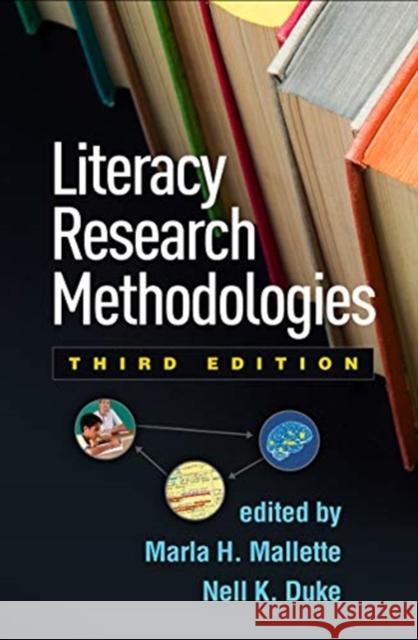Literacy Research Methodologies » książka



Literacy Research Methodologies
ISBN-13: 9781462544318 / Angielski / Miękka / 2020 / 470 str.
Literacy Research Methodologies
ISBN-13: 9781462544318 / Angielski / Miękka / 2020 / 470 str.
(netto: 250,30 VAT: 5%)
Najniższa cena z 30 dni: 246,69
ok. 16-18 dni roboczych.
Darmowa dostawa!
Different research methods can yield unique insights into literacy learning and teaching--and, used synergistically, can work together to move the field forward.
Wydanie ilustrowane
"I have used the past two editions of this book in graduate courses on how to read, critique, and plan literacy research, and both editions are dog-eared and well worn. I am thrilled to have the third edition--it is simply a 'must read' for graduate students in literacy education. This is a great text for any course in research methods or design because it addresses the fundamental importance of matching the research methodology to the research questions and resulting claims. A bonus is the exposure to exemplar studies from a variety of research paradigms, all of which make valuable contributions to literacy research. The third edition emphasizes the standards of quality for each methodology and the synergy afforded through mixed methodological approaches."--Marcia Invernizzi, PhD, Edmund H. Henderson Professor Emerita, School of Education and Human Development, University of Virginia
"This book describes literacy research methodologies in a way that is far reaching, yet clear and understandable to my doctoral students, who are sometimes intimidated by the topic. In my doctoral seminar, I had students explore particular methodologies presented in the text and analyze how they have been applied in published articles. This comparative analysis helped prepare students to apply the methodologies in their own research. Anyone looking to examine listening, speaking, reading, or writing can benefit from the recommended research guidelines presented for each methodology. "--Lauren Eutsler, PhD, Department of Teacher Education and Administration, University of North Texas
"The third edition of this text will whet the reader's appetite for understanding the latest methods for conducting and analyzing literacy research. To my knowledge, this is the only single-volume work of its kind. Students who are beginning to conduct research to test theories, or who want to examine the evidence, warrants, and claims conveyed by researchers or policymakers, will find the chapters clear and insightful. This is an essential text for doctoral seminars on literacy; it provides tools for generating innumerable stellar questions and answers. Excellence in knowledge building requires a book like this."--Rosalind Horowitz, PhD, Department of Interdisciplinary Learning and Teaching and Department of Educational Psychology, The University of Texas at San Antonio-Probably the single most striking feature…is the depth and breadth of the information presented in each chapter and the general liveliness of the text....Whole books have been written about each and every one of the methodologies presented. And yet, these chapters are amazingly satisfying in their fullness....Even a novice researcher, after reading these chapters, can get a very clear sense of the values, applications, procedures, concerns, standards, and complexities of each methodological approach. (on the first edition)--Journal of Curriculum Studies, 06/13/2007ƒƒHighly recommended. Graduate students, faculty, researchers. (on the first edition)--Choice Reviews, 06/01/2005
Foreword, Seth A. Parsons
1. Introduction, Marla H. Mallette & Nell K. Duke
2. Turtles, Tortoises, Ethnographies, and Case Study: Nuances of Difference and Design, Catherine Compton-Lilly
3. Content Analysis: The Past, Present, and Future, Samuel DeJulio, James V. Hoffman, Misty Sailors, Ramón A. Martínez, & Melissa B. Wilson
4. Correlational Designs and Analyses, Michael J. Kieffer
5. Critical Race Methodologies, Alice Y. Lee & Amos J. Lee
6. Research Methods Unique to Digital Contexts: An Introduction to Virtual Ethnography, Christine Greenhow, Sarah Galvin, & K. Bret Staudt Willet
7. Approaches to Discourse Analysis in Language and Literacy Research, Amy Vetter & Melissa Schieble
8. Design-Based Research in Literacy, Gay Ivey
9. Causal Effects: Randomized Trials and Regression Discontinuity, Christina Weiland, Anne Shapiro, & Julia Lindsey
10. Doing Historical Research in Literacy, Norman A. Stahl & Douglas K. Hartman
11. Instrument Development, Sharon Walpole, John Z. Strong, & Meaghan N. Vitale
12. Meta-Analysis, Adriana G. Bus, Marinus H. van IJzendoorn, & Suzanne E. Mol
13. Mixed Research Approaches in Literacy Research, Anthony J. Onwuegbuzie & Marla H. Mallette
14. Narrative Approaches: Exploring the Phenomenon and/or Method, M. Kristiina Montero & Rachelle D. Washington
15. Neuroimaging, Jessica A. Church & Jack M. Fletcher
16. Single-Subject Experimental Design, Susan B. Neuman
17. Understanding Literacy Trends Through Survey Research, Gwynne Ellen Ash, James F. Baumann, & James J. Bason
18. Verbal Protocol Analysis in Literacy, Byeong-Young Cho
19. Considerations of Methodology and Epistemology in Designing Literacy Studies, Sarah J. McCarthey
20. Conclusion, Marla H. Mallette & Nell K. Duke
Appendix. Alphabetical Listing of the Exemplars
Marla H. Mallette, PhD, is Associate Professor in the Department of Teaching, Learning and Educational Leadership at Binghamton University, State University of New York, where she also serves as Doctoral Program Coordinator. Her research focuses on early literacy, research methodologies, and mixed methods research in literacy. Dr. Mallette has published and presented on literacy research methodologies and the preparation of literacy researchers, and has used various methodologies in her own work.
Nell K. Duke, EdD, is Professor in Language, Literacy, and Culture and in the Combined Program in Education and Psychology at the University of Michigan. Her work focuses on early literacy development, particularly among children living in economic poverty. She has a strong interest in bridging gaps between educational research, policy, and practice. Dr. Duke is a recipient of the William S. Gray Citation of Merit from the International Literacy Association. She has used a variety of research methodologies in her own research and has taught courses on research design.
1997-2026 DolnySlask.com Agencja Internetowa
KrainaKsiazek.PL - Księgarnia Internetowa









